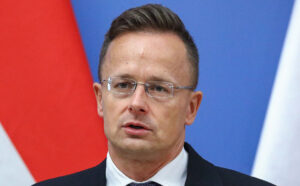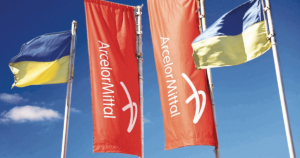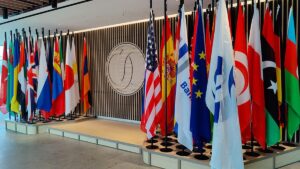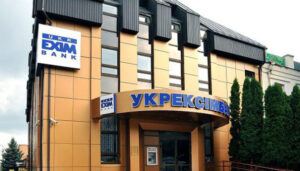
Hungary has decided to block the allocation of a EUR90 billion EU loan to Ukraine until oil transit to Hungary via the Druzhba pipeline is resumed, Hungarian Foreign Minister Péter Szijjártó said.
On Friday evening, he again accused Ukraine on social media of allegedly blackmailing Hungary by stopping oil transit in coordination with Brussels and the Hungarian opposition in order to create supply disruptions in Hungary and raise fuel prices ahead of the elections.
According to Szijjártó, Ukraine is violating the Association Agreement with the EU.
As reported with reference to Ukrtransnafta, as a result of a targeted Russian attack on January 27, significant damage was caused to the technological and auxiliary equipment of the Druzhba oil pipeline.
“Currently, work is underway at various stages to detect defects, stabilize the technical condition of the system, and eliminate the consequences of the hostile attack. Emergency repair work is being carried out with the involvement of specialized technical units and specialized equipment,” the company said in an official comment to Interfax-Ukraine on February 19.
Hungary and Slovakia stopped supplying diesel fuel to Ukraine on February 18 until the transit of Russian oil through the Druzhba pipeline is restored.
The European Commission, in turn, convened a meeting of the oil coordination group on February 25 in connection with the suspension of supplies to Hungary and Slovakia due to Russia’s damage to the Druzhba oil pipeline.

Chicken producer Kuriar attracted UAH 1 billion in loan financing from First Ukrainian International Bank (FUIB, Kyiv) to transform its business from a chicken producer to a system integrator in the industry, according to the Ukrainian Retailers Association.
According to the report, the funds raised will be used to modernize logistics, automate processes, develop deep processing of products, and introduce new quality standards for entry into national retail chains and EU markets.
“We are investing in standards that will allow us to become certified and enter the European market. This is a logical step for a company that plans to be a leader,” said company founder Andriy Kindifora.
According to the association, the company’s development strategy involves a transition to a growth model through cooperation with small and medium-sized producers. According to Kuriar CEO Ivan Semen, investments are directed not only at the company’s own brand, but also at creating a system that allows the industry to grow predictably, despite the difficult demographic situation and the shift of production capacities to the western regions of the country due to the war.
Cooperation with FUIB began with a factoring limit and grew into a strategic partnership. As noted by Igor Koptsyukh, the bank’s head of sales to medium-sized corporate clients, for the financial institution, this agreement is an investment in a business model with high scaling potential.
“For us, FUIB is not just a lender, but a partner that supports the company in the entire spectrum of financial decisions,” Kuriar emphasized.
K-Agroinvest Trade LLC (Kuriya brand) was founded in 2014 in the Zolochiv district of the Lviv region on the basis of facilities that have been developing since 2005. The vertically integrated full-cycle chicken producer has four poultry farms, a feed mill, a slaughterhouse, and a logistics center. It specializes in importing chickens and selling over 100 types of meat products. The beneficiary of the enterprise is Andriy Kindifora.
According to the National Bank of Ukraine, as of September 1, 2025, FUIB, with assets of UAH 193.14 billion, ranked 5th among 60 banks in the country. The ultimate beneficiary of the bank is Rinat Akhmetov.

The European Bank for Reconstruction and Development (EBRD) has granted another loan of up to $200 million to the Kryvyi Rih Mining and Metallurgical Plant PJSC ArcelorMittal Kryvyi Rih (AMKR, Dnipropetrovsk region) to replenish working capital for the plant’s operations.
According to the EBRD, a senior loan of up to $200 million has been granted to the Ukrainian joint-stock company AMKR, whose controlling stake is owned by the ArcelorMittal group.
It is specified that the loan was approved on December 3, 2025.
It is noted that the loan will be used to finance the company’s working capital needs to ensure continuity of operations in Ukraine when operations are affected by the war. The project will expand access to market-relevant training and employment opportunities for veterans and people with disabilities in line with the company’s priorities for human capital recovery.
It is also added that the Bank is providing financing in the extraordinary circumstances caused by the war in Ukraine, with a unique set of terms, attributes, and provisions. The project is also gender-additive in line with new commitments to expand access to training for young women through AMCR’s flagship New Factory initiative on youth inclusion.
As reported, on November 26, 2025, the AMCR Supervisory Board approved a significant transaction—a loan from the EBRD.
At the same time, the market value of the property or services that are the subject of the transaction is determined in accordance with the law – no more than $200 million (8480300 thousand UAH at the NBU exchange rate as of 11/26/2025); the value of the issuer’s assets, according to the latest annual financial statements, is UAH 51,725,655 thousand; The ratio of the market value of the property or services that are the subject of the transaction to the value of the issuer’s assets, according to the latest annual financial statements (in percent) – 16.3947658082%.
ArcelorMittal Kryvyi Rih is the largest producer of rolled steel in Ukraine. It specializes in the production of long products, in particular, rebar and wire rod. The company has a full production cycle, with production capacities designed for an annual output of over 6 million tons of steel, more than 5 million tons of rolled products, and over 5.5 million tons of pig iron.
ArcelorMittal owns Ukraine’s largest mining and metallurgical complex, ArcelorMittal Kryvyi Rih, and a number of small companies, including ArcelorMittal Beryslav.

The European Bank for Reconstruction and Development (EBRD) has signed an agreement with PJSC Ukrhydroenergo to provide a €75 million loan to finance the project “Modernization and restoration of hydroelectric power plant generation facilities,” the company said.
“The loan financing is supported by a European Union guarantee under the Ukraine Investment Framework, an instrument for mobilizing financing for Ukraine’s recovery and long-term growth,” the company said in a statement on its Telegram channel on Thursday.
According to the statement, the financing package also includes investment grants from international donors amounting to EUR 20 million.
“The estimated total cost of the project, including Ukrhydroenergo’s own contribution, is approximately EUR 120 million,” the company concluded.
According to the chairman of the supervisory board, Valentin Gvozdiy, attracting EBRD financing under the EU guarantee is an important confirmation of the confidence of international partners in Ukrhydroenergo and the quality of the company’s corporate governance.
“The project will strengthen the reliability of hydroelectric power plants and, accordingly, the stability of Ukraine’s energy system,” he said.
As noted in the statement, the project funds are planned to be used, in particular, to purchase critically needed equipment for certain hydroelectric power plants of the company, such as hydraulic power equipment damaged as a result of Russia’s military aggression, hydromechanical equipment for modernization, and equipment for responding to emergencies in conditions of martial law (emergency assistance mechanism).
As noted by Bogdan Sukhetsky, acting director general of Ukrhydroenergo, the funding will enable the timely purchase and implementation of critically needed equipment, as well as the creation of a reserve for rapid response to emergencies.
“The availability of these funds is important for maintaining the continuous operation of the enterprise and fulfilling production tasks in difficult conditions,” he stressed.
The project also includes programs to improve the qualifications of engineering personnel, enhance ESG practices, and prepare an action plan for gender equality. The project is scheduled for completion in 2030.

The European Bank for Reconstruction and Development (EBRD) is providing OTP Leasing with an unsecured loan in local currency equivalent to up to EUR 20 million to support micro, small and medium-sized enterprises (MSMEs) affected by the Russian Federation’s war against Ukraine.
“The financing will help strengthen the competitiveness, resilience, and inclusiveness of Ukrainian MSMEs by expanding access to leasing products in conditions of liquidity shortages and heightened economic uncertainty,” the bank said in a statement on Wednesday following the signing of the necessary documents.
It is noted that 50% of the loan funds are planned to be directed to MSMEs for long-term investments in technologies that meet European Union (EU) standards, in particular “green” technologies, and the financing should enable enterprises to obtain transport, equipment, and machinery without significant initial capital expenditures at a time when liquidity remains limited due to war factors.
Upon completion of the investment projects, borrowers who meet the program criteria will receive EU-funded technical assistance and US-funded investment incentives under the EU4Business initiative.
Additional grants are available for businesses that have suffered destruction, loss of assets, or forced displacement, as well as for companies that promote the reintegration of veterans, persons with disabilities, and IDPs, and for MSMEs that have relocated or operate in affected regions, with support also extending to businesses led by women and young people.
The loan will be supported by an interest rate subsidy of up to 10% from the US through the EBRD’s SME Special Fund.
According to the EBRD, the company is its current client and a leading leasing company in Ukraine, providing financial leasing and fleet management services to corporate clients and MSMEs throughout the country.
Since the start of Russia’s full-scale war against Ukraine, the EBRD has raised more than EUR 9.1 billion for Ukraine, including EUR 3.3 billion through partner financial institutions.
OTP Leasing is a non-bank financial institution subsidiary of Hungary’s OTP Bank, which has been working with the EBRD for many years.
In the third quarter of 2025, the company’s revenue increased by 7.3% compared to the third quarter of 2024, to UAH 1 billion 242.3 million, while net profit almost doubled, to UAH 808.0 million.
EBRD, FINANCING, LOAN, OTP LEASING, SMES

Dniprometiz-TAS LLC (Dnipro), owned by Ukrainian businessman Serhiy Tihipko, intends to conclude an additional loan agreement with Ukreximbank (Kyiv) to open a non-revolving credit line with a limit of EUR 2.020 million (equivalent to UAH 99,934,450 thousand) for a term of 36 months.
According to the company’s report in the information disclosure system of the National Commission for the Regulation of Energy and Public Utilities (NCCPE), the general meeting of participants of Dniprometiz-TAS LLC on December 22, 2025, decided to grant consent for the company to perform legal acts which collectively meet the criteria of a significant transaction, namely, the conclusion with JSC Ukreximbank, within the framework of general loan agreement No. 25-63KG0010 dated September 25, 2025, of an additional agreement for EUR 2.02 million.
In addition, the meeting participants agreed to conclude an agreement on the pledge of the company’s movable property (47 units of equipment with a market value of UAH 58,708,300) as collateral for the performance of obligations under general loan agreement No. 25-63KG0010.
It is specified that the meeting was attended by company participants who collectively hold 100% of the votes and have the right to vote on all items on the agenda. 100% of all company participants voted in favor of the decision.
As reported, the general meeting of participants of Dniprometiz-TAS LLC on September 4, 2025, decided to approve the conclusion of a general loan agreement with JSC Ukreximbank with a credit transaction limit equivalent to UAH 600 million.
According to the results of January-September of this year, Dniprometiz-TAS LLC reduced its net profit by 2.9% compared to the same period last year, to UAH 11.727 million. At the same time, the company’s undistributed profit at the end of September amounted to UAH 274.763 million.
In 2024, Dniprometiz-TAS increased its net profit by 47.7% compared to 2023, to UAH 14.197 million from UAH 9.610 million, while net income increased by 22.7%, to UAH 3 billion 285.688 million. At the same time, the company’s undistributed profit at the end of 2024 amounted to UAH 263.048 million.
According to the results of 2023, Dniprometiz reduced its net profit by 2.6 times compared to 2022 – to UAH 9.658 million from UAH 24.733 million. Over the past year, net income increased by 8.2% – to UAH 2 billion 677.836 million.
According to the results of 2022, Dniprometiz reduced its net profit sixfold compared to the previous year, to UAH 25.572 million, while net income increased by 1.1%, to UAH 2 billion 474.397 million.
Dniprometiz-TAS manufactures metal products from low-carbon steels. The company’s capacity is 120,000 tons of products per year.
T.A.S. Overseas Investments Limited (Cyprus) owns a 98.6578% stake in Dniprometiz LLC.
The authorized capital of Dniprometiz-TAS LLC is UAH 83.480 million.